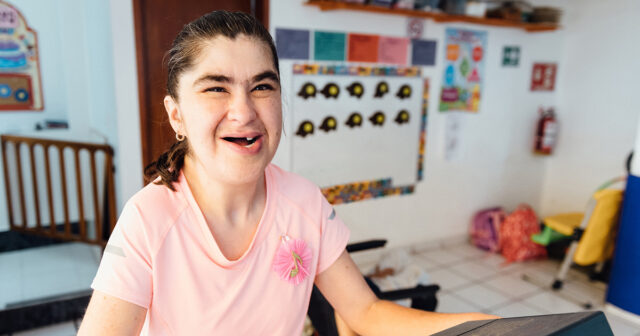The National Disability Insurance Scheme (NDIS) provides a critical way for people with disability to access housing and living supports. The NDIS Review Final Report has made two recommendations to reform current housing and living support, with a stated aim of improving access for all people with disability.
What are housing and living supports?
Housing supports are accommodation and living environments while living supports are the supports that assist NDIS participants with daily living needs. These supports include:
- Supported Independent Living (SIL) – living supports that help participants in their daily living at home, to build skills for independence. It includes things like personal care or cooking assistance.
- Assistance with Daily Life (ADL) – supports to assist with everyday needs, like household cleaning and gardening.
- Specialist Disability Accommodation (SDA) – a housing support that is designed to meet the needs of people with complex disability needs.

What changes to housing and living supports has the NDIS Review recommended?
NDIS participants often have little choice about where, how, and with whom they live, and they often have the same provider providing both housing and supports. There is also a critical shortage of available, accessible and affordable housing.
The NDIS Review has aimed to address these issues by recommending significant reform of housing and living supports, through the following two recommendations:
- Recommendation 8: Fund housing and living supports that are fair and consistent, and support participants to exercise genuine choice and control over their living arrangement.
- Recommendation 9: Deliver a diverse and innovative range of inclusive housing and living supports.

Are the proposed changes good?
PWDA has long called for a Targeted Housing Plan under Australia’s Disability Strategy and the separation of housing from supports, and so we welcome the NDIS Review calling for both under Actions 9.11 and 9.7 respectively.
PWDA also welcomes additional actions to address housing supply and accessibility. The actions calling for more SDA properties to be built in locations where more is needed (Action 9.6) and for repurposing old housing stock owned by state and territories (Action 9.8) which could help address the chronic undersupply of housing for people with disability.
PWDA also welcomes the push for more accessible social housing, with the NDIS Review calling for new social housing to be built to gold level Livable Housing Design Standards, and for all remaining state governments to implement the standards (Action 9.11). This change should also be linked to the National Housing and Homelessness Agreement and the National Housing Plan.
Taken together, all these actions could mean more housing options for people with disability.
Which proposals need further consideration?
PWDA has serious concerns about a proposal for shared supports for participants requiring 24/7 living support. Under Action 8.1, the Review recommended that people accessing 24/7 living support would be required to share supports with two other people.
While this is an improvement on current shared support arrangements, where someone can share supports with anywhere from 4 to 9 other people, we need a system that allows people to live where they want and with whoever they choose.
Shared living supports compromises choice and control because it can lead to a person with disability being influenced to share housing and living supports and live in an arrangement they can’t get out of.
With the already limited number of accessible housing options, we are concerned that in practice, sharing supports can and will still lead to grouping people with similar support needs together, slowing down the end of segregated housing that the Disability Royal Commission (DRC) Final Report called for (see DRC Recommendation 7.43).
The proposed shared living supports also directly contradicts statements in the NDIS Review Final Report:
At the heart of a new housing and living approach should be a more urgent shift away from group home settings with little choice and control to one where participants can choose their living arrangements and the supports they need. No one should be forced to enter a living arrangement that is not of their choosing.
(p.141)
PWDA also has concerns about the introduction of an independent shared support facilitator to support participants who share housing and living supports (Action 8.4). It’s unclear how supports would be chosen for consideration, and the level of influence that the facilitator may hold in decision-making.
PWDA is also concerned that participants may need to try living situations before they opt-in (Action 8.3). The success of this action will rely on the availability and accessibility of relevant housing stock, and this remains in question.
The power of combined NDIS Review and DRC housing recommendations
Taken together, recommendations from both the NDIS Review and the DRC can could substantially improve living conditions, including access to more housing options and choice and control over with whom, how and where people with disability live.
PWDA calls for the DRC recommendation to desegregate housing to be implemented and welcomes the NDIS Review actions. However, the NDIS Review proposal for shared 24/7 living supports must be reconsidered.
Make a suggestion
Want more information on the NDIS Review report? Fill in this form to tell us what topics you want to know more about or questions you want answered. PWDA will do our best to cover the most frequently asked questions and suggested topics in future updates, including blog articles, newsletters and social media content.
